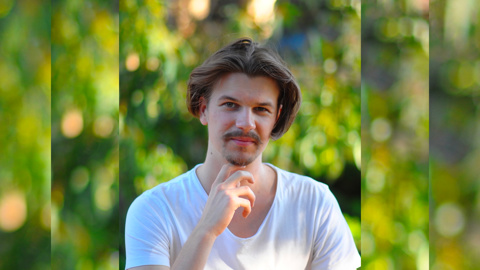Before you hear Adelaide-based composer Jakub Jankowski's debut String Quartet 'Kairos' live on stage in September, get to know the insight behind the work with Jakub's own program notes.
Kairos is one of two words for time in Ancient Greek. It refers to the qualitative and personal experience of a turning-point.
1. Prologue
2. Hymn I
3. Icarus in the Mountains
4. Hymn II
5. „The Death of Lovers”
6. Prelude and Trance
7. Hymn III
8. Epilogue
In the Prologue we begin with a kind of pre-music. Music that is not brought about through any song or dance, but is rather conjured up of its own accord. Music born from silence.
A cold gust of wind carries the music into the first of three Hymn movements, which are all glimpses of a music which is ever present in the background of the piece. Hymn I dematerialises almost as suddenly as it appears, leading to… Icarus in the Mountains. There is something of an Icarus in every performer (and all of us are in essence performers). In this movement, Icarus appears in the Carpathian mountains of Eastern Europe (rather than over the Mediterranean Sea) - caught between stylised Polish highlander music, and the overtone series. Will he steer a middle course and emerge unscathed? Next is the Hymn II movement - a musical expansion of the 1st Hymn. This movement ends with what can only be described as a sonic impression of a musical ruin. I write down a major chord, and it rusts.
Out of this ruin emerges the 5th movement - „The Death of Lovers” - based on a poem of the same name by Charles Baudelaire (from Les Fleurs du Mal). The poem suggested to me a particular atmosphere I sought to capture musically:
We will have beds imbued with mildest scent,
And couches, deep as tombs, in which to lie,
Flowers around us, strange and opulent,
Blooming on shelves under the finest skies.
Approaching equally their final light,
Our twin hearts will be two great flaming brands
That will be double in each other’s sight -
Our souls the mirrors where the image stands.
One evening made of rose and mystic blue
We will flare out, in an epiphany
Like a long sob, charged with our adieus.
And later, opening the doors, will be
An Angel, who will joyfully reglaze
The tarnished mirrors, and relight the blaze.
(Translation: James McGowan)
After the movement’s conclusion, we seem to approach a dead-end… where now?
Prelude and Trance is a temporary (and deceiving) solution to the question posed at the start of the piece. Here, the music chooses intoxication as the answer.
The 7th movement, Hymn III is simultaneously the clearest distillation of all the Hymn movements, but also it’s deconstruction. As the movement continues, the music is gradually carried away, calmly whirling itself out of existence…
In the Epilogue, this whirling is transformed back into silence.
Hear Jakub's new work live on stage across Australia as performed by The Goldner String Quartet and Piers Lane from 20 Sep - 9 Oct. Book your tickets now.

